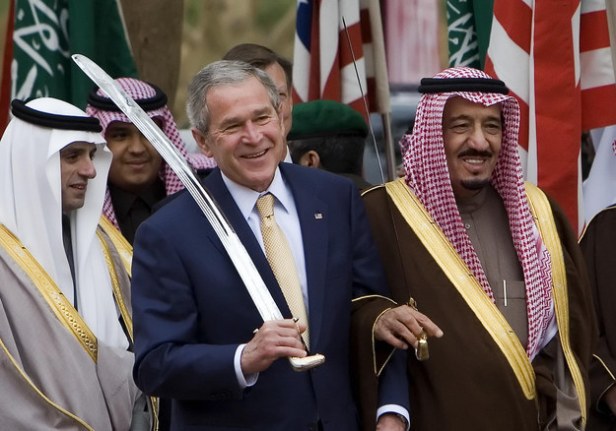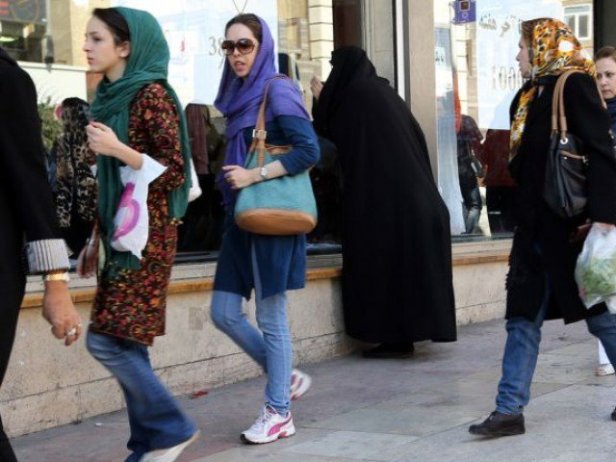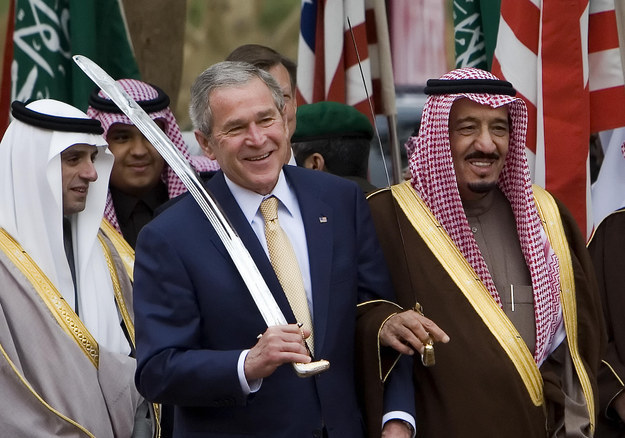If you believe everything you hear in what passes for media in the west, you must think this is an open-and-shut case. Iran is relentlessly demonized across the board, and Saudi Arabia is the west’s bff. The US state department has designated four countries as ‘state sponsors of terrorism.’ They include Iran, Sudan, Syria and North Korea with a superlative like ‘biggest’ or ‘worst’ usually applied to Iran. This is repeated like a mantra on outlets like CNN, Fox News and the BBC. It was also designated by the neo-cons of the Bush Jr. years as part of the ‘axis of evil’, and has also garnered the title of a ‘rogue state.’ Meanwhile, Saudi Arabia enjoys the unquestioning loyalty of the highest echelons of both of America’s leading political parties, has a seat on the UN Human Rights Council, and President Trump, on a recent trip to the kingdom initiated talks for a 110 billion dollar weapons deal.

This discussion could easily veer into a number of different digressions such as the ideological differences between Sunni and Shia Islam, the historic and cultural divide between Arabs and Persians, and the not-so-civil war in Syria. Each of these issues are relevant to this topic, but are so complex that they require a separate post of their own, which maybe I’ll get to at a later date. I will limit this post to the recent histories of these two countries, a brief overview of their domestic human-rights records, and their support for terrorism.
First of all, Iran is a Persian, Shia, Islamic republic with an elected president and an unelected supreme leader, while Saudi Arabia is an Arab, Sunni absolute monarchy. Both countries are theocratic and authoritarian to varying degrees and have criminalized homosexuality, consumption of alcohol and apostasy.
Saudi Arabia executes more than 150 people a year, usually by beheading in the public square.
 In 2016 Iran executed between 530 and 567 people (down from 966 in 2015). As of now, public executions are banned, but there are still reports of them, especially in rural areas. As recently as last decade, stonings were common, but they have also been outlawed by recent reforms. Nowadays, their preferred method seems to be hanging people from cranes.
In 2016 Iran executed between 530 and 567 people (down from 966 in 2015). As of now, public executions are banned, but there are still reports of them, especially in rural areas. As recently as last decade, stonings were common, but they have also been outlawed by recent reforms. Nowadays, their preferred method seems to be hanging people from cranes.

The two countries rank 2nd and 4th in the world in executions, with Iran leading the way.
Iran requires that all government officials at least proclaim to practice Islam, and it’s citizens are forbidden from converting from Islam to another religion. However, those born into a non-Muslim family and foreigners practicing another religion are allowed to worship freely. Saudi Arabia adheres to strict sharia law, and all citizens are required to be Muslim. Blasphemy against Islam is punishable by death. The practice of other religions is officially prohibited, and there are religious police patrolling the streets on the lookout for it. Underground churches do operate out of private homes, mostly by Filipino migrant workers, and some Saudis participate at great personal risk.
Saudi Arabia is notoriously rough on their female citizens. Women there are largely viewed as property of their male family members. Their movements are restricted and they can do almost nothing without the permission of a male guardian. In Iran, women are free to move about independently and are encouraged to attend higher education.

You can’t fully understand the present without first understanding the past. Some historians consider the Persian state to be the second oldest nation in the world at about 3,000 years, surpassed in longevity only by China. Prior to 1950 Iran was a thriving democracy and were trying to spread democracy throughout the Middle East. In that year, prime minister Muhammad Mosaddeque made the fatal error of trying to nationalize the oil industry and keep the profits in Iran. Rights of Iranian oil at that time were held by the Anglo-Iranian Oil Company. Declassified documents reveal that the CIA and MI6 staged a coup over Mosaddeque in 1953. They installed Mohammed Reza Pahlavi, AKA ‘The Shah,’ as their puppet dictator. The ensuing quarter century was characterized by brutal repression, including routine imprisonment and torture of dissidents. But BP and Royal Dutch Shell’s profits soared, so mission accomplished for the intelligence agencies. But resentment was brewing in the hearts of Iranians, and they rallied behind the spiritual leader Ruhollah Khomeini and were successful, in the 1979 Iranian revolution, in establishing the Islamic Republic of Iran we know today. The Shah was allowed safe passage into the US (for medical treatment, we’re told) with around $20 billion he stole from the Iranian treasury. The West, ever persistent, responded by providing Saddam with the raw materials to produce sarin and cyclosarin nerve gasses. The CIA, again according to their own declassified documents, provided the Iraqi army with reconnaissance information on possible targets within Iran, resulting in hundreds of thousands of civilian casualties. As you would imagine, anti-American sentiments have remained strong among some elements of Iranian society. America and Israel are commonly referred to as ‘Big Satan’ and ‘Little Satan’ respectively. This inflammatory rhetoric has somewhat lessened recently as many Iranians who fled the country during the revolution and the Iraq-Iran war for the West are now returning with positive reports of Western culture. In 2013 they elected the moderate, reformist president Hassan Rouhani who ran on a platform of improving relations with the West.
If you take a quick look at Arabian history, the first thing you notice is that it was never nearly as unified as Persia. The house of Saud traces it’s history back to Mohammed bin Saud in the early 18th century. A long period of wars with rival families and the Ottomans ensued, but the house of Saud remained a relativity successful family with a lot of land. The Arabian peninsula remained a pretty desolate, inhospitable place with no strong nation-state until 1938 when vast oil reserves were discovered. The house of Saud, not possessing the technology and infrastructure to extract and export the oil, teamed up with an American oil company called the Saudi American Oil Company (now called Saudi Aramco and under Saudi control, but with close ties to existing American oil companies), and that’s how the unholy alliance began. Modern Saudi Arabia grew out of this oil deal. The house of Saud had now amassed extraordinary wealth. And, as any good government knows, the best way to hold onto that wealth and prevent revolution is to promote some type of ideology that will unite and distract the peasantry, keeping them weary of outsiders but not suspecting of any ill-intent on the part of their rulers (see Communist Cult of Personality, Zionism, Fox News etc.). They decided on Wahhabism. Wahhabism is an ultra-orthodox, fundamentalist interpretation of Sunni Islam with heavy emphasis on social conservatism and infidel hating. Wahhabists are not afraid to resort to jihdism. This is the same ideology of Al-Qaeda, ISIS, Boko Haram, Al-Shabaab, Al-Nusra and any other actual Islamic terrorist group you can think of. It is the official state religion of Saudi Arabia, forced on the population, but is not practiced by the monarchy who are frequently spotted drinking, doing drugs, and sleeping with prostitutes. Wahhabism was started in the 18th century by Muhammad ibn Abd al-Wahhab, a close associate of Muhammad bin-Saud.
According to the 9-11 Commission Report, Saudi’s funded the attacks of that day. Also, 15 of the 19 hijackers and Osama bin Laden came from Saudi Arabia. Saudi Arabia has long tried to eliminate secularism in the Arab world. Secularism often leads to democracy and human rights, which is not good for business. With the Baathist out of the way in Iraq, Assad in Syria is viewed by many as in the Saudi cross hairs. Here is a video of Secretary of State John Kerry, in a rare moment of honesty, admitting that ‘Arab countries’ (Saudi Arabia and Qatar) offered to fund an American invasion of Syria. Are we supposed to believe they have nothing to do with the current Wahhabi invasion of that country? Isn’t it interesting that wherever in the world ISIS and Al-Qaeda go they are correctly called ‘terrorists’ except in Syria where they are called ‘rebels?’ ISIS and Al-Qaeda are international mercenary armies that recruit fighters from all around the world. Their fighters are very often radicalized in Saudi-funded Wahhabi mosques and madrasas. Saudi Arabia announced that they would accept zero refugees from the war in Syria but would be happy to built more Wahhabi mosques across Europe. Although she wouldn’t say so publicly, Hillary Clinton made reference to Saudi funding of ISIS in a leaked email to John Podesta. You can read about that in more detail in this Intercept article.
One of the best kept secrets in the world right now is the conflict in Yemen. I can barely go online without bumping into something about Syria, but I wonder how many people really know what’s going on in Yemen. The new government there has allied itself with Iran, and the Saudis with the use of US weapons and intelligence have launched a brutal bombing campaign including cluster bombs (illegal under international law). Trump’s first military action in office was to launch a raid in Yemen, that even Obama turned down, that resulted in the deaths of more than thirty civilians, including an eight year old American girl. The Saudi Navy has blockaded the country, causing a famine. The UN reports that 17 million people are on the brink of starvation. You can get the details in an AlJazeera report here. According to a WHO report from earlier this week, at least 859 people have died from a cholera outbreak as a result of the blockade.

For me, Saudi Arabia is the one-stop, catch-all response to any comment about America being a force for good in the world. For example; if anyone says, “The US cares about democracy, freedom and human rights,” “Say it with me folks ‘Islamic terrorism,'””beautiful little babies,” the response to any of this nonsense is, “Oh yeah? What about Saudi Arabia?”
As for Iranian sponsorship of terrorism, people usually point to their support of Hezbollah and Hamas. But these are regional, reactionary organizations responding to Israeli hegemony. And while some hardliners in Palestine and Lebanon want all the Jews to go home or worse, violent attacks by either organization are few and far between. The occasional rocket is promptly responded to x100 by the IDF. I don’t recall the last time Hamas set off a bomb in a Western country. There is little doubt that Hezbollah has exasperated the Israel-Arab conflict, even inviting it to flow over their borders. But to compare them to the international Wahhabi organizations mentioned above, I contend, is ludicrous. Hezbollah is actively at war with Islamic terrorists in Syria (as indeed is Iran itself) while their primary antagonist, Israel, has been acting as AL-Nusra’s air force for years.
Every now and then I hear someone in the Western media say something along the lines of, “Iran wants to wipe Israel off the map.” This idea comes from one speech given by former Iranian president Mahmoud Ahmadinejad in 2005. Obviously ‘wipe off the map’ is an English idiom that probably doesn’t exist in Farsi. So what did he actually say? Farsi speakers agree that a better translation is, “This regime occupying Jerusalem must vanish from the page of time,” with a more comparable English saying being more like ‘this era must come to an end,’ with the primary focus being on ‘time’ and not ‘location.’ When arguing semantics in a foreign language, it’s easy to fall into a ‘he said, she said’ kind of debate, so Israeli propaganda has gotten away with this argument, and it is repeated ad nauseam. But even if he did say that, so what? It’s one quote from one person. A lot of Americans fall into the trap of thinking that there is no diversity of opinion in other countries. American senators like Tom Cotton, John McCain and Lindsay Graham are paid handsomely to say insane things like, “We need to bomb Iran before they bomb us,” and, “Iran is trying to take over the whole Middle East.” These are mostly talking points drawn up by Saudi and/or Israeli funded think tanks. But everyone realizes that this is not how most American’s think. If you judged the entire country of the US on the words of its most war-hungry, bought-off politicians you would think it’s a real threat to Iran. If you judged Israel by the words of Ayelet Shaked (a politician who called for genocide against the Palestinians), you must think that country is downright diabolical. You can also find reasonable quotes from Iranians. The media could mention this quote from current president Hasan Rouhani. “Iran rejects weapons of mass destruction based on its religious belief system as well as its ethical standpoint.”
I know there was great optimism when Rouhani was elected, and even more optimism when he negotiated the removal of sanctions, some of which had been in place since ’79, and returned Iran’s frozen assets. Now Israel and the religious right in America are trying to reinstate those sanctions, which is emboldening the religious right in Iran, and the moderates may be losing their authority. Western people need to gain a more balanced perspective on Iran to build a foundation of knowledge to be able to question the relentless propaganda coming out of think tanks in Washington. Sky News did a pretty balanced report you can watch here . You can see the perspective of a woman who traveled alone to Iran here.
Due to what has been in the news this past week, a post about state-sponsored terrorism should mention Qatar. Qatar is also a Wahhabi monarchy, and, like Saudi Arabia, they are known to support terrorism to achieve their geopolitical goals. It was they who were the main financiers of the original Arab-Spring uprising in Syria in 2011. This is because Syria didn’t accept their proposal to build a natural gas pipeline from the Persian gulf to Europe. Syria has a strong alliance with Russia who is Qatar’s main competitor in the natural gas business in Europe. Qatar has also shown support for Hezbollah in the bast, which as I mentioned isn’t a big deal for me, but a lot of the Sunni countries aren’t happy about that. But this is all trivial. The stated reason for the new embargo, led by Saudi Arabia, UAE, Bahrain and Egypt is that Qatar supports terrorists. Though true, Saudi Arabia throwing this accusation at anyone is a classic example of the pot calling the kettle black. So this excuse is bullshit. I suspect that the real reason is that Qatar maintains normal, neighborly diplomatic relations with Iran. There is a large natural gas deposit in the Persian Gulf that is split between Qatari and Iranian territories, so they really have to work together for business. Qatar seems to be all about its personal business interests and hasn’t really chosen sides in the whole regional Iran v Saudi Arabia dispute. My guess is Saudi Arabia feels emboldened by Trumps support and has adopted a more ‘you’re either with us or against us’ approach to its neighbors. This sounds like an oversimplification, but, in my observations, Saudi foreign policy takes a very childish, stubborn line.
I mentioned earlier that the Trump administration announced that it was negotiating a $110 billion weapons deal with the Saudis. It hasn’t been approved by congress yet, and, at least to my knowledge, the inventory hasn’t been disclosed yet. But you can bet they are overpaying. The US routinely overcharges the Saudis for weapons as a matter of policy. They could buy similar weapons from the Russians or Chinese for cheaper. The truth is they are buying more than just weapons. They are paying for their right to continue being a human rights black hole and the silent complicity of the international community. This is the same reason they gave the Clinton Foundation $25 million for…you know…whatever the Clinton Foundation does back when they thought Hillary would be the next president. Overpaying is a common form of bribery. People are beginning to catch on to it on the personal level. For example, people rightly called out Hillary for charging a quarter million dollars a speech and Obama for giving a $600,000 speech to wall street, so they could thank him for approving their bailout. But overpay bribery also happens on a national level.
The hypocrisy of the West’s policy in the Middle East has become very difficult for them to defend. Trump recently stood in Riyadh (the belly of the beast) and, while surrounded by Wahhabists, blamed Iran for the problem of Islamic Terrorism. You know all those terror attacks that have been going on in Europe lately. How many of those people were shiites? Look into it. A real journalist somehow snuck into a State Department press briefing recently and called out the spokesperson for this hypocrisy. How much longer can they keep this up?

In conclusion, our politicians, the media and the corporations they both serve want us to believe all three of the following; terrorism is bad, countries who enable terrorism through funding and indoctrination are our friends, and countries who are fighting terrorism are our enemies. What a triumph of propaganda. This total inversion of reality is only possible with a profoundly ignorant populace. And they seem to have that in the bag.

wigshair extensions iwkjdt 97309
LikeLike